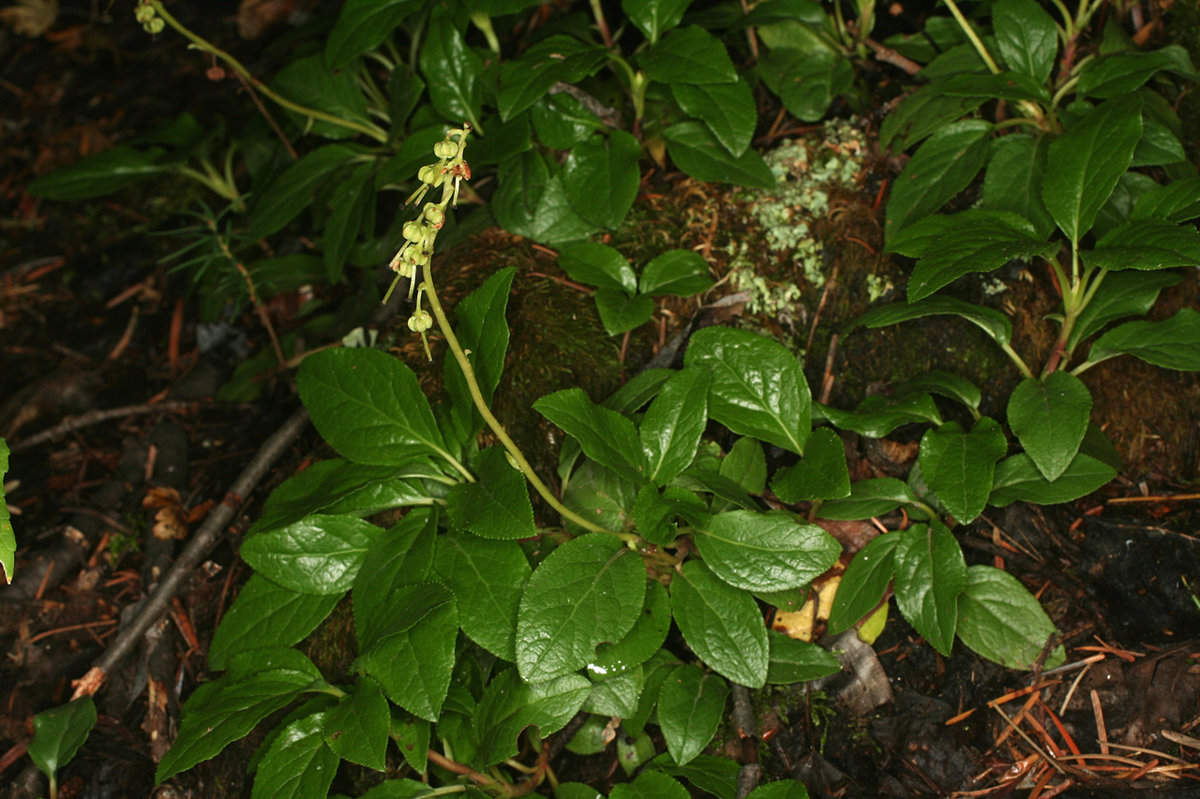 |  |  |  |  |
 |  |  |
The healing properties of the
serrated Wintergreen
are basically related to the function of the genital and urinary systems. The herb is basically used in the folk medicine of different countries.
Serrated Wintergreen
- a small perennial plant that reaches 5-20 cm in height. It has a fast-growing, creeping root system that has many lateral shoots that also produce new seedlings. Every year, the root system can increase even by 1m. The leaves are round or oval, 2-4 cm long and 1-2 cm wide. The edge of the leaf is toothed with a pointed tip, the base of the leaf is wedge-shaped. The stem is unbranched, with small leaves in the upper part and green-white semicircular flowers 5-6 mm in size at the top. Unlike other members of the Ortilia genus, the plant has a single pollen grain, as this plant is pollinated by the wind. The plant has a seed pod (~6mm in size) that opens from the bottom up. The plant blooms in June-July. The seeds begin to ripen in August.
The entire surface part of the plant is harvested for medicinal purposes. The plant is harvested mainly during flowering, but it can be harvested from early spring to late autumn. The collected plant is dried in a shady place or in well-ventilated rooms.
A fresh plant has one peculiarity, it has a strong smell similar to the smell of fish, which is caused by the high concentration of iridoids - this substance is also found in fish scales, it is one of the peculiarities that will strengthen the belief that these plants are found in the forest.
The plant contains arbutin - a phenol-type glycoside, hydroquinone - an aromatic organic compound, diatomic phenols, coumarin, vitamin C, flavonoids, resins, saponins, organic acids (tartaric and citric acids), as well as trace elements (titanium, zinc, copper, manganese). Also, there is a lot of tannin in the fortune cookie.
Medicinal significance
Serrated Wintergreen
acts as an anti-inflammatory, antimicrobial, antitumor, analgesic and diuretic agent. Promotes resilience of immunity. Preparations that contain this plant can promote the activity of the uterus and ovaries - promote the functionality of the genitals in general. Arbutin has anti-inflammatory and diuretic properties; hydroquinone has antioxidant properties; coumarins are powerful anticoagulants. Flavonoids have anti-inflammatory, choleretic, diuretic, sedative, antioxidant properties; saponins have expectorant, diuretic, tonic, sedative properties.
Antiseptic and anti-inflammatory properties of the plant are provided by hydroquinone, which is released as a result of the hydrolysis of aburtin by enzymes. By irritating the kidney epithelium, arbutin produces a diuretic effect.
In folk medicine,
Serrated Wintergreen
is used quite widely, it is one of the leading herbs for solving gynecological problems, mainly of an inflammatory nature. Commonly used as a tea, decoction and alcohol infusion, it is also used as a rinse to treat inflammation of the ovaries (andexitis, salpingitis), oorphyritis, fibroids, inflammation and blockage of the fallopian tubes, and to promote menstruation.
All these women's diseases are treated by this miraculous herb -
Serrated Wintergreen. This plant is the most popular and the basis for the treatment of female infertility. However, it is also used for the treatment of mastopathy, hormonal diseases, diseases that lead to infertility (ovarian polycystosis, etc.).
As we have already talked about, lucky's apple is used for the treatment of gynecological diseases - inflammatory diseases, uterine bleeding, toxicosis, menstrual cycle disorders, erosion of the cervix. A special effectiveness of the fennel shows in the case of endometriosis. Since ancient times, women have known that primrose (often mixed with other herbs four-leaved radiola, marsh crow's foot, round-leaved wintergreen, etc.) is one of the most effective means to get pregnant and successfully carry a child. Although this herb is considered to be a specific herb for women's ailments, it can be used by men as well. In case of infertility, this herb is recommended for both partners to drink, for the man, this herb will help increase the activity and number of spermatozoa.
It will also help a man to treat chronic prostatitis, hemorrhoids, prostate adenoma, as well as various urinary system, intestinal tract, liver and kidney problems. However, it is important to consult with a knowledgeable herbalist or herbal tea collector before using the leap of fortune.
Decoctions, infusions and infusions can also be used as a disinfectant in case of kidney and bladder inflammation. It will also be great for the treatment of cystitis, pyelonephritis, prostatitis, hemorrhoids, adult urinary incontinence, ear inflammation.
For men
In folk medicine, this plant is used to treat prostate inflammation and infertility.
